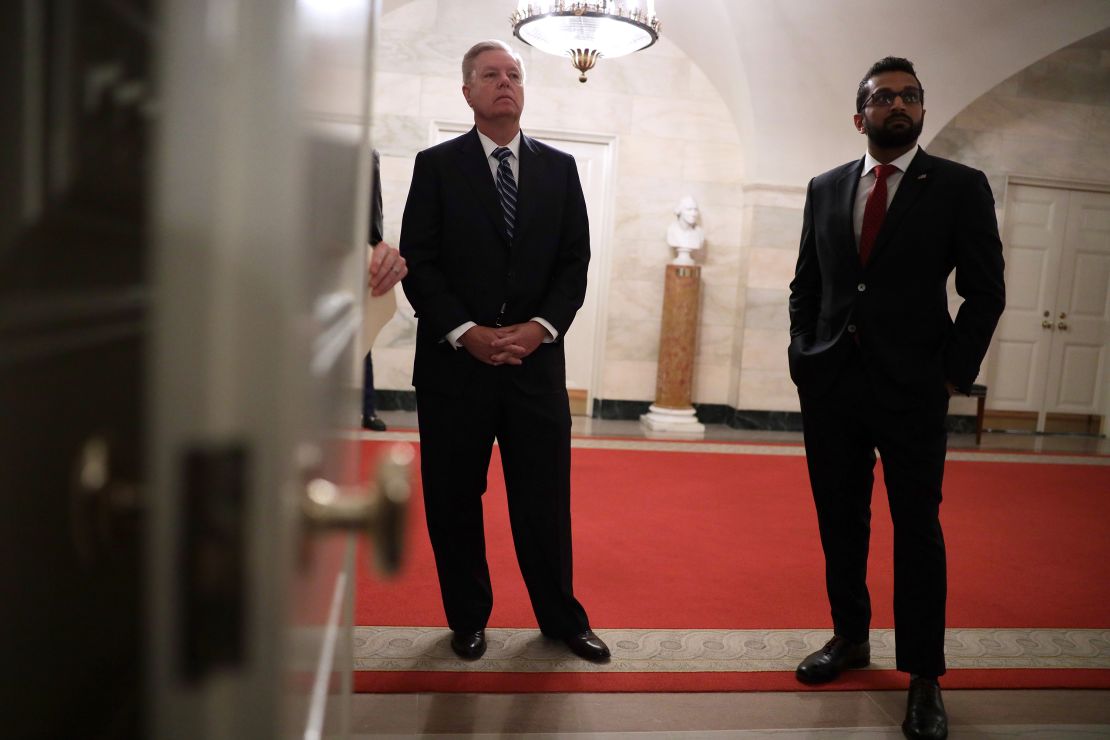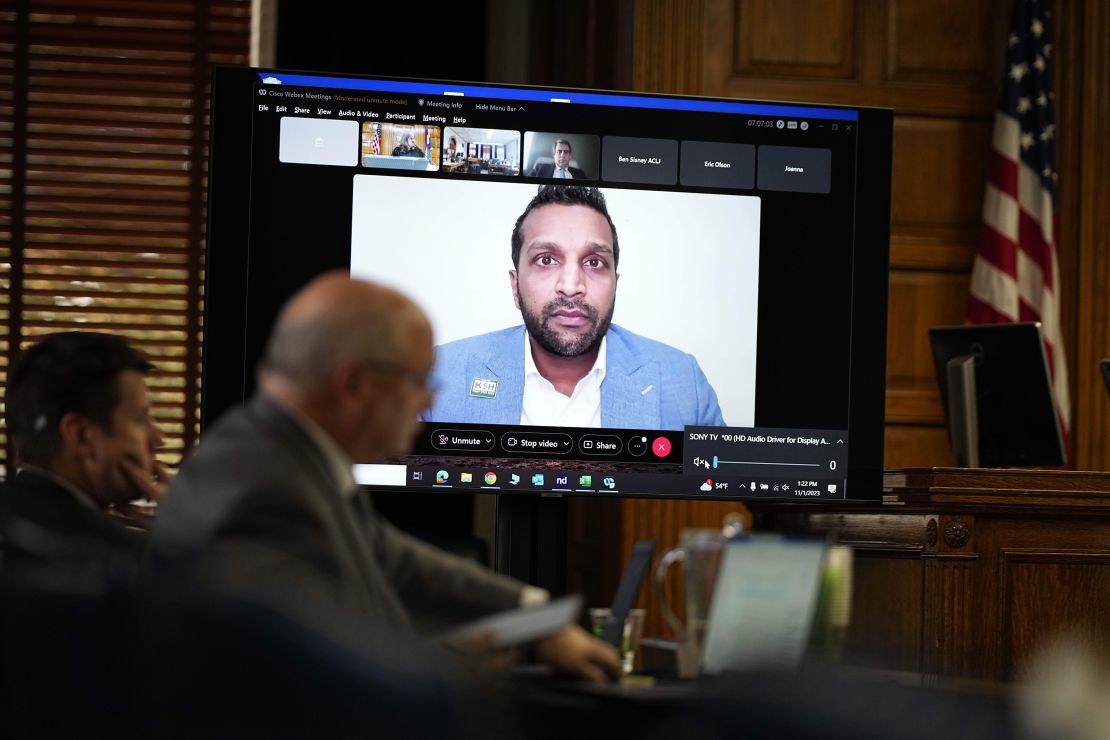CNN
—
Years before he was Donald Trump’s pick to lead the FBI, Kash Patel was a midlevel Justice Department lawyer who once drew the ire of a Texas judge who described Patel as being precisely the kind of federal bureaucrat he has vowed to weed out in his crusade against the so-called deep state.
In January 2016, Patel had just landed from a trip to Tajikistan as part of his job with the DOJ’s National Security Division when he turned up at a Texas courthouse to join the government trial team in a federal counterterrorism case. Though it had been proceeding for weeks, it was Patel’s first time showing up in person as part of the prosecution.
The judge was immediately suspicious of him.
“Who is this Patel guy?” Judge Lynn Hughes asked the government’s lawyers, criticizing one of them for letting Patel use his account to enter his notice of appearance in the case.
Later in his chambers, the judge ripped into Patel for not wearing a suit and tie, telling him he didn’t add a “bit of value” to the government’s team and accused Patel of being a “spy” for his bosses in DC.
“You’re just one more nonessential employee from Washington,” said Hughes, who later doubled down by issuing an “order on ineptitude” on Patel and his Justice Department colleagues and putting the episode in the court record.
The encounter, which was reported at the time by The Washington Post, makes an appearance in Patel’s 2023 book, “Government Gangsters,” where he wrote that DOJ leadership were “cowards” for not publicly defending him and that the department “didn’t have my back.”
The encounter also made an impression on some of Patel’s colleagues. Though judges routinely dress down government lawyers, it was clear that the incident was notable and bothered Patel.
“We were actually supportive and sympathetic,” one former colleague recalled. “But he had a conspiracy theory that the US attorney’s office had set him up and he wanted us to get vengeance.”
It wasn’t until much later, after Patel had risen to top national security positions inside the White House and Pentagon toward the end of the first Trump administration, that Patel’s reaction to the incident fully made sense, the former colleague said.
“Thinking back about it now, I can see the arc of him going from this guy who was obsessed with one episode to someone who sees enemies everywhere,” the person said. “I think he was always like this, an opportunist who feels constantly aggrieved.”
Patel’s years as a government lawyer, first as a public defender in Miami, then later as an attorney in the Obama-era Justice Department, are crucial to understanding his disdain for the elites who run Washington.
Patel, who begins his rounds on Capitol Hill this week as part of his confirmation process, rose rapidly as a star in the MAGA movement, coining a gold-flecked moniker, K$H, to sell merchandise including T-shirts and Trump-adjacent children’s books. That rise has been driven by ambition, an uncanny survival instinct, and a strong sense of grievance toward the government he used to work for, according to people who have worked with him over decades.
Interviews with more than a dozen individuals who worked with Patel shed new light on his path to power. After what appears to be a satisfactory, if unremarkable, legal career, Patel gained a reputation as a useful Republican Hill staffer on the House Intelligence Committee, where he dug into the origins of the FBI’s Russia investigation of the Trump campaign. After joining the White House as a member of the National Security Council, Patel became known as an aggressive colleague, sources say, often clashing with others.
Patel’s biggest success, sources say, was his ability to cultivate a close relationship with Trump. Multiple former Trump officials told CNN he appeared at times more focused on getting face time with Trump than on actually doing his job.
“Clearly, his strategy ultimately worked,” one source said about Patel’s efforts to get close to Trump dating to 2019.
While his proximity to Trump has ebbed and flowed since he left office, Patel has remained one of the loudest critics of the FBI, calling it the “prime functionary of the Deep State” in his book and suggesting in a recent podcast that he would dismantle the FBI’s headquarters in DC on Day 1, turning it into “a museum” for the crookedness he says he saw there.
Despite Trump allies’ insistence that he’s fit for the job, many of those who crossed paths with Patel, including Democrats on Capitol Hill, are skeptical about his ability to run the FBI, given the sheer scope of the job.
“The (FBI) director leads an agency that’s going after Russian and Chinese spies, mobsters, kidnappers,” one source familiar with the transition’s discussions about the FBI job told CNN. “The biggest job he’s ever had was an NSC senior director, which is a big job, but it usually manages, what, 12 people? The FBI has 35,000 employees.”
Not everyone who has worked with Patel agrees. Earl Matthews, a former Trump official who worked with Patel in the White House, said he brings a unique resume to the job.
“How many FBI directors have been criminal defense attorneys?” Matthews said. “He’s been a criminal defense attorney, and he’s also been a prosecutor. He’s been on both sides of that legal dichotomy. … So, that’s a unique perspective that might be good for an FBI director.”
In response to a detailed list of questions from CNN about Patel, a Trump transition spokesperson provided a blanket statement of support.
“Kash Patel excelled as a terrorism prosecutor for the DOJ and received an award in 2017 from the DOJ for his efforts prosecuting members of the al-Shabaab terrorist organization. As former National Security Adviser Robert O’Brien has said, Kash is ‘one of the most experienced people ever to be nominated for FBI director,’” Alex Pfeiffer said in a statement. “America is going to be safer with Kash Patel as the FBI Director.”

In his book, Patel wrote that he first became interested in becoming a lawyer after caddying for defense attorneys in Long Island, New York, and dreaming of the money he could make in the profession – a dream he said never materialized.
Instead, after no one would hire him fresh out of Pace University Law School in 2005, Patel decided to pursue a career as a public defender in part because of how much he enjoyed trial litigation in law school, according to his book.
As a public defender in Florida for eight years, people who worked with Patel at the time recall him as good at face-to-face interactions and building rapport with judges, but uninterested in the paperwork and legal arguments that came with the job.
In his book, Patel wrote that he didn’t fit in with his cohort of defense attorneys, who he said were politically on the left, juxtaposed to what he describes as his more conservative upbringing and personal beliefs.
Patel made the move to Washington when he was hired as an attorney in the Justice Department’s National Security Division in late 2013, according to his book.
One colleague who has known Patel since his years as a Miami public defender said what many critics don’t see is that Patel has always felt underestimated – especially by many of the Ivy League lawyers he was surrounded by at the Justice Department’s DC headquarters, who he thought had an easier time getting jobs.
“These people always looked down at him,” the longtime former colleague said. “But he has to be a smart guy to get where he is. He is a survivor.”
After the 2016 election, Patel was hired by then-Rep. Devin Nunes, the top Republican on the House Intelligence Committee at the time, who promised to use his investigative powers to look into the FBI’s probe of connections between Trump’s campaign and Russia. According to Patel’s book, Nunes said that if he helped with the investigation, he would “do everything he could” to help land Patel his dream job working for the National Security Council at the White House.
Patel quickly gained notice among Trump allies for helping to write a brief report – which became known as the “Nunes Memo” – detailing alleged errors made by the DOJ in obtaining a warrant to surveil a former campaign adviser to Trump. Patel’s work found a ready audience in conservative media and eventually gained the attention of Trump.
The DOJ Inspector General later released a report that found there were problems with the FBI’s surveillance but did not find that the bureau conducted the Russia investigation with partisan motivations, despite claims from Republicans.
By 2019, after Republicans lost their House majority, Nunes worked to make good on his promise to help Patel get to the White House.
“(Patel) was forced on the NSC by Devin Nunes and Trump,” said Charles Kupperman, who served at the time as Trump’s deputy national security adviser.
Kupperman told CNN that Trump personally asked him and then-national security adviser John Bolton to find Patel a job at the White House – a request they initially rebuffed.
A couple of months later, Kupperman said Trump called him and Bolton again with a second request to find Patel a job at the NSC.
“We said, ‘OK, Mr. President, we’re seriously trying to find him an appropriate job. But given his background right now we don’t have an appropriate position,’” Kupperman said.
“The third time Trump calls he says, ‘Look just, just get him a job.’ And so, we put him in the international organization directorate,” Kupperman added, referring to an obscure agency within the NSC.
Still, Kupperman said he had serious suspicions about Patel, fueled in part by what he says was Patel’s reputation for leaking sensitive information to conservative media outlets while working for Nunes.
One day, months after hiring Patel, Kupperman said he walked into the Oval Office for a meeting with Trump only to find that Patel, a low-level NSC staffer, was already in the room.
“‘Why is Kash here for this meeting?’” Kupperman said he remembered thinking. As he and members of the White House counsel’s office sat down, Kupperman said Trump started talking about expanding Patel’s responsibilities to include finding out who in the White House and the NSC weren’t sufficiently loyal and had been leaking information.
Kupperman told CNN that he and White House counsel Pat Cipollone pushed back on the idea – insisting that there were other ways to ensure no one on the NSC was leaking. Cipollone did not respond to CNN’s request for comment on the episode. But as the conversation went on, Trump got a phone call from Fox News host Sean Hannity, Kupperman said.
“So he puts him on the speaker phone. He goes, ‘Sean, I’m sitting here with Charlie Kupperman, John Eisenberg, Cipollone and Kash Patel, and we’re having a meeting,’” Kupperman told CNN. “And you know, Sean Hannity says to Trump, ‘Oh, I love Kash Patel.’”

Ultimately, Kupperman said he and White House lawyers were able to block Patel’s proposal to become Trump’s “political commissar,” a role that would have allowed him to monitor NSC staffers’ emails and cell phones to identify leakers.
But the episode offers a window into how Patel would subsequently leverage his relationship with Trump and some of the president’s key allies to advance his career.
Soon after the 2019 Oval Office meeting, Patel successfully lobbied for the job of senior director for counterterrorism at the National Security Council.
While in that role, Patel continued to harp on the Russia investigation, gaining more favor with Trump and building up his reputation as a staunch loyalist, especially as he worked to declassify portions of the Nunes memo.
“He’s shown some efficacy in bringing to light otherwise classified or sensitive information into the public domain when others were not able to do that,” said one source familiar with Patel’s work on the House Intelligence Committee and subsequent efforts related to the Russia probe. “So clearly, a willingness to push the envelope to sort of fight against norms, standard practice, for the benefit of getting information out or embarrassing the intelligence community or the administration – or in this case, perhaps justifying President Trump’s actions.”
Patel, the individual said, “is clearly dogged and determined and won’t take no for an answer, and those types of traits that I’m sure are appealing to the president.”
It was one of the reasons Patel was moved to the Office of the Director of National Intelligence as a principal deputy under acting Director Richard Grenell in early 2020 as Trump sought to install loyalists inside the US intelligence agencies and tasked them with rooting out the so-called deep state he believed opposed him.
Throughout Trump’s first term, Patel regularly inserted himself into situations he believed would help him gain favor with Trump. But once involved, Patel often demonstrated a lack of expertise and attention to detail that proved disruptive, multiple sources said.
That was true in October 2020 when Patel nearly compromised efforts to rescue an American who was captured in West Africa, according to Trump’s former Secretary of Defense Mark Esper.
Esper told CNN that he launched US special operators to rescue the American “on the premise we had airspace clearance into that country to conduct that operation” – information that Esper believed came from Patel.
“And we found out hours later that it was not true,” Esper told CNN’s Kaitlan Collins, adding that by that time, the Navy SEAL team was already in the air. “For a moment in time there, at least an hour, it jeopardized the mission,” he said.
While the raid ultimately was successful, Esper said the breakdown, attributed in part to Patel, could have put the captured American’s life at risk and warranted further investigation after the fact.
But there is no evidence that Patel’s role in the incident was ever scrutinized. Another source familiar with the incident told CNN that some national security officials who worked with Patel on Africa issues no longer trusted the work he produced and even found other mistakes later that had to be corrected.
The Pentagon and January 6

Just months later, Patel was elevated to a new role at the Pentagon after Esper and other top defense officials were fired by Trump. Trump’s decision to install Patel as chief of staff for then-acting Defense Secretary Chris Miller was widely viewed as a reward for the loyalty he had demonstrated and would come to define his subsequent rise in the years that followed.
That appointment came after Trump sought to install Patel as deputy FBI director, a position that is traditionally held by a career FBI agent, a move that then-Attorney General William Barr blocked.
While at the Pentagon, Patel worked to help Trump try to overturn the 2020 election results in yet another demonstration of loyalty that has become a prerequisite for candidates seeking top jobs in his second administration.
Those relationships and Patel’s previous face time with Trump would prove valuable as the president-elect mulled over candidates to serve as FBI director during his second term.
Patel benefited from an informal and personality-based interview process for the job, two sources familiar with the discussions said. He was also buoyed by the backing of prominent voices in the decision-making process, including Donald Trump Jr., Eric Trump and Ric Grenell – endorsements that gave him an edge over other top candidates like former GOP Rep. Mike Rogers, the sources said.
Another source close to the transition also characterized Patel’s views related to the FBI as “radical,” even for those in Trump’s orbit who share the view that major changes are needed at the agency.
“This was Trump getting back at the FBI,” the source said.
Given the president-elect’s rhetoric around retribution during the campaign, there is an expectation that Patel may be primed to investigate Trump’s political adversaries. Asked during his interview on NBC’s “Meet the Press” about previously saying he would direct his Justice Department to appoint a special prosecutor to investigate President Joe Biden, Trump said he would not but left the door open for top DOJ officials to make their own determinations, including his pick for attorney general, Pam Bondi.
“No, I’m not doing that unless I find something that I think is reasonable,” Trump said in the interview, which aired Sunday. “But that’s not going to be my decision. That’s going to be Pam Bondi’s decision, and, to a different extent, Kash Patel, assuming they’re both there, and I think they’re both going to get approved.”
Trump suggested he had concerns that Patel’s vocal support of the MAGA movement might make him a difficult pick, but instead, Trump said, conservatives have rallied to support Patel.
“He’s very popular,” Trump said, calling Patel “very good and very fair.”
“I’ll tell you, I thought Kash may be difficult because he’s, you know, a strong conservative voice and I don’t know of anybody that’s not singing his praises,” Trump said.
One former colleague who has known Patel for over a decade believes criticism of him is blown out of proportion. He said Patel won’t use the FBI to pursue enemies and that his public comments are bluster intended to support Trump.
“He’s not gonna go after anyone, he’s going to go in there and focus the bureau on crime, going after the cartels and doing the work they should be doing,” the former colleague said.
It remains to be seen whether Patel will pass the confirmation vote in the Senate. But if he does, Patel will have positioned himself to act both as Trump’s shield – protecting him and his allies from the so-called deep state – and as Trump’s sword, using the country’s most powerful law enforcement agency to do his bidding.

